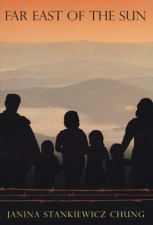Janina Stankiewicz Chung to pen story of love and triumph "While most Americans know of the atrocities of World War II through films such as Holocaust, Sophie's Choice, and Schindler's List, Janina Stankiewicz Chung simply knows. Her family endured life under communist oppression in Russia, forced relocation to Hitler's hellish concentration camps, and the sorrow of losing their homeland. And that's just part of her story.." From the publisher's Web site for "Far East of the Sun" By Debbie Gardner PRIME Editor "My entire life, I wanted to write [this book]." So said first-time author Janina Stankiewicz Chung to PRIME as we talked in the comfortable lobby of Holyoke's Loomis House retirement community, where Chung is the dining room manager. Clad in a flowing cream pantsuit, her hair swept up to reveal a graceful neck and expressive eyes, it was hard to believe the woman with the lilting Slavic accent sitting across from me had reached the 70th birthday she admitted to. Just as it was hard to reconcile the fact that the tale she had spun, chronicling the struggles of a young couple caught in the upheaval of Russia's Bolshevick revolution and Hitler's domination of Europe, was drawn from true events very close to her heart. "It's based on my parent's life," said Chung. "Sasha and Anya are two different people, but I made Sasha and Anya go through what they went through." And what her family endured on their journey from oppression in Europe to freedom in America. Telling their tale "My mother and father had always told stories of their life in Russia and Belarus," Chung said. "When my father passed away I started spending more time with my mother." As she learned more and more about her parent's struggles and life story, Chung said, "I thought, 'I really should write this down.'" But desire wasn't enough to motivate Chung to put pen to paper right away. In fact, it wasn't until 2000, when her mother passed away, that she decided "I really can't let this go I must tell the world what they went through." She said she spent four years "thinking about it . you really have to discipline yourself . to be able to put something on paper." In 2004, she took up the challenge. And though she had never written anything before in her life, Chung set up a writing schedule as rigorous as that of the accomplished writers PRIME has interviewed over the years. "I disciplined myself to write a half-hour before work and 45 minutes after work," said Chung. "And I worked long hours then [as a restaurant manager in Sturbridge]." But that job at the Sturbridge Host Hotel also brought Chung into contact with a valuable asset, someone who could help her refine her writing skills. "I was very fortunate. One of my hostesses, Karen Krasinski, was [an English] teacher in Southbridge," Chung said. " I had a page [and] I showed it to her and asked if she could put it in context." After reading her efforts, Chung said "she said, 'I think you've got something here.'" After that first consultation, Chung said she would write "at random" and pass her efforts along to Krasinski, who took the pages home, put the thoughts into context, and retyped the material. "She would work until one or two a.m. because she had such a great feeling about [the story]," Chung said. "When we got nine pages, we were so thrilled." When the collaborators had about 19 finished pages, Chung said she thought it was time to look for a professional editor. Again, she turned to a contact at her Sturbridge job for help, this time, a regular customer by the name of Bill Lemke. "He said, 'I happen to know somebody'," and introduced Chung to freelance editor Rita Schiano. "She took my 19 pages and said, 'you have something here . I have a good feeling.'" Schiano offered to work with Chung for a reduced price because she was a first-time writer, then told her to "go home, and when you have 100 pages or so, we'll get together and go over it." |
 |